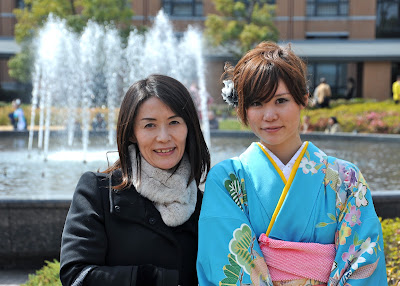Japan is certainly facing the most difficult time it has faced since WWII - the 9.0 earthquake and aftershocks, tsunami destruction and a nuclear catastrophe at the Fukushima Nuclear Plant. The world is worried and concerned about Japan and its people. Countries are worried about their citizens in Japan, companies are worried about their employees in Japan, universities are worried about their exchange students in Japan and parents are worried about their children in Japan. This is all very reasonable and right. As of today 90 international exchange students from my university have decided (or have had it decided for them) that they are going home.
I am not in any position to critique such a decision. Better safe than sorry. I am not a fan of nuclear power and I severely question the actions of governments and nuclear power companies in times of crisis. Still one needs to be cautious about reacting to information that is not accurate. The international media is making the nuclear situation sensational to say the least. Headlines and teasers are misleading and many people don't bother to read details buried deep in the story.
Perhaps the greatest disservice to everyone living in Japan has been the foreign press 'mis'-reports in their attempt to present 'Breaking News' which in turn have inflamed home country families to an emotional level that they bombard many of us living here with calls of GET OUT! RUN! ESCAPE! (Nakamura post on EASIANTH listserv, March 21, 2011)
Japan is suffering from cultural orientalism and geographic orientalism. People need to look at a map. Japan is not as small as is being reported. Not all of Japan is at risk in this crisis. I came across this Twitter post from tomoakiyama that puts things in perspective:
Distance between Three Mile Island & NYC: 100 miles / Between Fukushima Nuclear Plant & Tokyo: 150 miles. Stay calm pple.
The distance between Fukushima and Osaka is 350 miles.
Do the research and make up your own mind. Don't be blinded by sensationalism and biases in the media and governments...
And so while we can worry and debate about the safety of Osaka and Japan, in areas not directly effected by the earthquake and tsunami, life generally goes on. This isn't an act of ignoring the problems or of defiance or indifference. It is real life. Over 3000 students graduated from my university on Saturday. They have worked hard and we are proud of their accomplishments. A moment of silence was held during the ceremonies and a student group collected donations for the recent earthquake in New Zealand and the earthquake and tsunami in the Tohoku region of Japan.
For more information about the student group (in Japanese):
http://lets-help-chch.moo.jp/
Now for the pictures of the celebrating students, student groups and family members:
The Center for International Education at my university is advising students to monitor these web sites for more information:
International Atomic Energy Agency (IAEA)
http://www.iaea.org/
World Health Organization (WHO)
http://www.who.int/en/
Japan Times
http://www.japantimes.co.jp/
Kyodo News
http://english.kyodonews.jp/
Here are a couple of links to stories from the BBC:
http://www.bbc.co.uk/news/health-12722435
http://www.bbc.co.uk/blogs/thereporters/ferguswalsh/2011/03/japan_nuclear_leak_-_health_risks.html
Here is some information from the Ministry of Internal Affairs in English especially for foreigners:
http://www.e-gov.go.jp/link/disaster_en.html
Regarding volunteer efforts, see the Tokyo Voluntary Action Center website:
http://www.tvac.or.jp/di/20996.html
Related: "Why I’m not fleeing Japan" at Washington Post.com
http://www.washingtonpost.com/opinions/why-im-not-fleeing-japan/2011/03/16/ABQsdhk_story.html
Related: "With Crises, Universities Worry About Students Abroad" at NY Times.com
http://www.nytimes.com/2011/03/18/nyregion/18campus.html?_r=2&hpw
















5 comments:
The regulation levels have been exceeded but there is not an immediate effect on people’s health. Why the reason of putting a safety level in the first place if it doesn’t matter when it’s surpassed? Cancel the levels! You are safe even it’s surpassed by 127 times! The Japanese government keeps you saying that everything is ok in spite of radioactive food, radioactive tap water, radioactive seawater, radioactive dust, and radioactive rain/snow.
No one blindly follows or believes the government. Many of us are checking multiple sources inside and outside of Japan to figure out what is going on. That is what this post is encouraging others to do as well.
Not all of Japan is suffering from "radioactive food, radioactive tap water, radioactive seawater, radioactive dust, and radioactive rain/snow." Certainly there will be consequences down the line but for now those of us hundreds of miles away from the Fukushima reactor are OK.
The regulation levels have been exceeded but there is not an immediate effect on people’s health. Why the reason of putting a safety level in the first place if it doesn’t matter when it’s surpassed? Cancel the levels!
I think some might not understand the purpose of this post. I am not addressing regulation levels or even the safety of people close to Fukushima (of course we need to be concerned about them). I am reporting on the situation in Osaka and by extension other areas far away from the nuclear reactors. I am concerned about the media representations that perpetuate the cultural and geographic stereotyping of Japan.
Hi, I was just introduced to this site and already I feel this will be a blog I'll return to again and again (I'm about to transfer into a school within my University in which we make our own majors out of concentrations in different courses - and my planned concentrations are appropriately Anthropology and Asian Studies).
Regarding the article, I agree about looking into different media representations. In one of my classes, we spent time specifically on this issue. We were concerned with how US news coverage differs significantly from those in Japan, and even others world wide. The class in called Memory Wars, where we study representations of the Japanese memory of WWII. These natural catastrophes, even if they don't directly effect the majority of Japan, are still astounding in their affect when you just think about how eerily reminiscent the damage is to, say, the atomic bomb attacks:
http://www.nytimes.com/2011/03/15/world/asia/15elderly.html?ref=world
Post a Comment